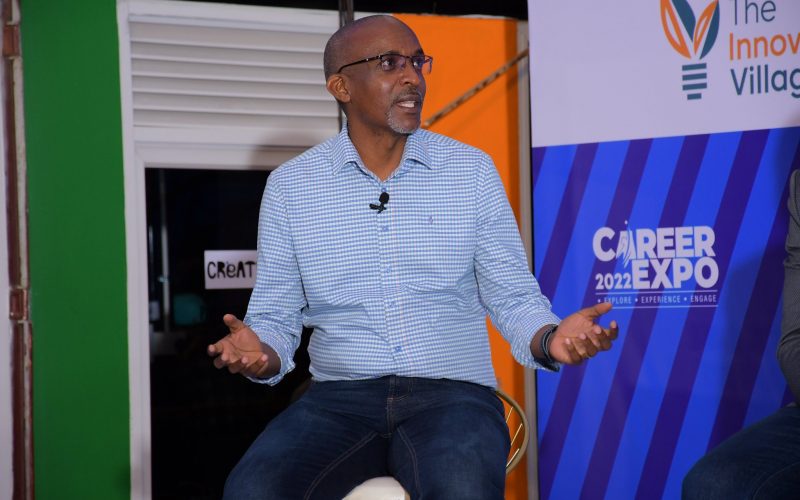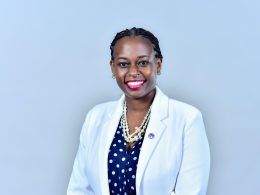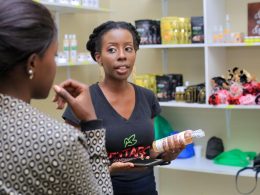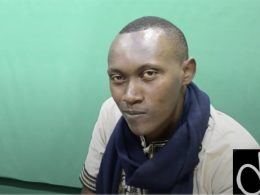By Mark Kawalya
Michael Niyitegeka is a man who wears many hats. He is a tech enthusiast, a mentor to young people and works as a humanitarian through his membership in the Rotary Club.
“I call myself a tech enthusiast because I did not study IT professionally. I went into the field purely out of interest and passion.” he says. Currently Niyitegeka is the program director at Refactory, a revolutionary programming academy that takes students from 0 to job market ready in all but 9 months. But the journey hasn’t been smooth sailing for the easy-going father of two. He had grab with both hands whatever opportunities life threw his way and picked himself up by his bootstraps after missing a university admission for a course he at the time felt was his calling in life.
A humble background
The dynamic and forward thinking Niyitegeka came from a humble background with hardworking parents of modest means. His father worked in a tea factory, and they lived in a simple house that was next to the factory’s garage that repaired tea tractors. A young Michael decided earlier on in life that engineering was his lifelong calling after watching with excitement as weary tractors would roar back to life at the skillful hands of expert mechanics.
“My siblings and I lived the typical life that children growing up in the countryside live. I played football on the roadside with friends. I would be sent out to graze goats and would be answerable to my parents in case one goat disappeared. My father had one bicycle, which was the family’s transport. It was a very humbling upbringing, and we learned early on that contentment in life often has nothing to do with status.”
From a young age, he learned to take everything his parents provided with gratitude. “My father would candidly tell you, that you are going to school, but we have borrowed the money for your tuition. You could not afford to play in school with such information. ” he says reminiscing.
Primary education
Like was the case in many rural areas at the time, Michael didn’t go to nursery school. He started school in primary school, and fate would have him attend three primary schools. He left his first primary school in Fort Portal because the cold climate adversely affected his health.
He joined a school that was three kilometers away, which, incidentally, was also the best primary school in the area. A tea tractor would ferry kids to the school from the tea estate where they used to live “We were considered privileged because we would pass other kids on the road who would be walking to school as we rode atop the tractor bed.” He and his siblings were later was moved to Kabale district to St Maria Goretti Rushoroza another primary school that belonged to a bishop. It was 14 hours to Kabale from where we lived. “We used to wake up at midnight and start our journey to Kasese to take the bus to Kabale that would be leaving at 5 a.m. and reach Kabale at 8.00pm. We would travel three days before the school term started to get there in time and refresh ourselves from the long journey. This was about 1986, and there were so many road blocks manned by soldiers on the roads in those days.”
A bootcamp for a high school
He joined St. Leos College for six years of secondary school. He remembers the school being akin to a military boot camp with harsh living conditions. “We had no glass panes in the windows, and when it rained, we got polythene bags and covered the broken windows.”
“However, it taught me independence and to appreciate the little things in life. He took a job after completing his senior four and was given an opportunity to work in the tea factory garage. He worked as a spanner boy at the start but within a month he had been promoted to a full mechanic. There was always a mechanic on call during a specific shift and soon he was able to take a whole shift by himself as the designated mechanic on call. He was given a full tool box with all spanners after two and a half months as a gift for his efforts.
A university encounter that led to IT
Niyitegeka wanted to pursue engineering and as such, he majored in physics, chemistry, and mathematics in his advanced secondary education. To his dismay, his final exam results were not satisfactory enough for him to be accepted for an undergraduate engineering course at Makerere University.
“I was given a Bachelor of Arts in Arts, a course I had not even applied for. It comprised philosophy, organizational studies and French. Taking that course was one of the decisions that I took that showed me how much I had matured.” he notes.
Michael went on to graduate in 2001 and began working as an administrator and teacher in Makerere University’s faculty of arts. He worked in the arts faculty for four years before embarking on his MBA. “Eventually I met Professor Venansius Baryamureeba, with whom I had interfaced earlier in high school at Saint Leos College. As I was joining Senior 1, he was one of the older boys in Senior 6. We became friends and he looked out for me.”
The two friends later met at Makerere University, while Niyitegeka was finishing his Master of Business Administration degree. Baryamureeba informed me that he was in the process of starting an information technology program at Makerere and needed people who could teach business.
Michael was given the job and started teaching business at the faculty, but also applied himself to learning everything he could about information technology to bolster what he was delivering in his business lectures.
“I always tried to learn and listen with intent. I would try to understand why people were talking about a subject, then I would go and read about it.
The birth of Refactory
After working at the faculty of information technology at Makerere University, for a number of years, Niyitegeka became dissatisfied with what they were doing with the students in terms of preparing them for the world of work. “There was a gap with our curriculum in terms of its ability to aptly prepare students for the professional world ” he says.
He went to his boss Professor Baryamureba and mentioned the need to set up an office that would interface with industry players about what they needed from graduates.
Niyitegeka was appointed the head of the newly formed corporate engagements department and the more he interacted with industry players, the more he realized how wide the gap was.
The institution considered his recommendations too radical and Michael tendered his resignation.
In 2014, he met two gentlemen who had been given a grant to start up an IT training program in East Africa. He explained to them that the country wouldn’t benefit from another IT degree program. What it needed was a program that would prepare students for work. “They were convinced by my hypothesis and we spent four years trying to understand what the industry was looking for specifically in the field of software engineering.”
The team got an industry partner and applied for a grant from the government of Norway in 2018. After getting the grant, they started Refactory, which takes on people from any industry for a three-month skilling program. The students learn both the hard and soft side of software engineering. After three months, students enter a six-month boot camp.
Since the program started training professionals, 92% of their graduates have found employment within the first six months of graduating from the program. “I think that the argument that there are no jobs may be inaccurate. Many students may simply not be aptly prepared for employment.” Michael says. He has also learned that employers are generally not looking for experience, as is often misconstrued. They frequently seek candidates who are eager to learn and have the right attitude. Employers are willing to train successful candidates in the skills they need for the job.
What he does in his leisure time
He loves running, which keeps him fit and helps him clear his head. He also loves spending time with his wife and two children. Once a month, he drives to Fort Portal to check on his elderly mother and help her manage some home affairs. He loves a good laugh and watches stand-up comedy as it is an excellent avenue for de-stressing. His favorite dish is kaloo (millet bread) with beef or chicken stew. He will occasionally drink a glass of wine or a single glass of single-malt whiskey. However, having grown up on a tea plantation, tea is his favorite drink, which he can indulge in at any time of the day.








